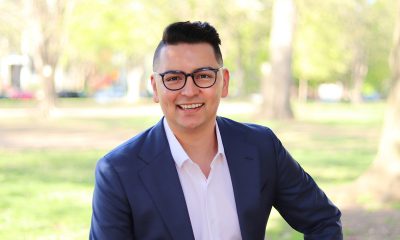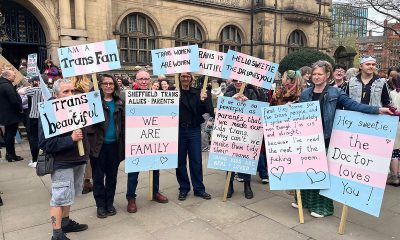News
Lesbian, trans Defense nominees sail through confirmation hearings
Biden picks exemplify change after LGBTQ bans lifted
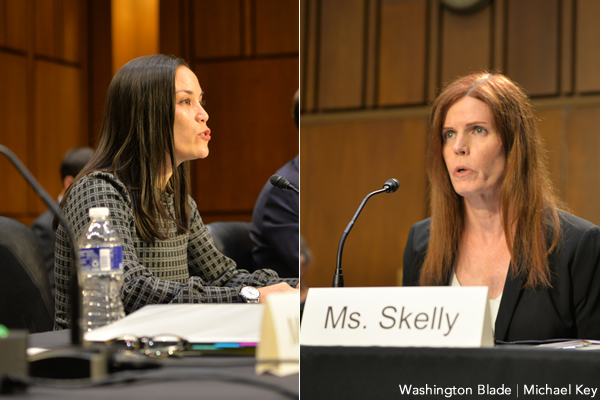
Two nominees, one lesbian and one transgender, sailed though a breezy confirmation hearing on Wednesday for high-ranking positions at the Defense Department.
Among the five nominees questioned before the Senate Armed Services Committee were Shawn Skelly, who’s transgender and nominated to become assistant secretary of defense for readiness, and Gina Ortiz Jones, who’s a lesbian and nominated to become under secretary of the Air Force.
The LGBTQ nominees for the high-ranking posts stand out in the wake of the Biden administration enacting to reverse the transgender military ban enacted under President Trump, as well as the coming anniversary of the lifting of “Don’t Ask, Don’t Tell.”
Both Jones, a former Air Force pilot, and Skelly, a 20-year veteran of the U.S. Navy, served in the U.S. military at times when they would have been discharged due to their sexual orientation or gender identity.
Jones made a reference to serving under “Don’t Ask, Don’t Tell” as part of her opening statement for the confirmation hearing.
“My experience in the Air Force was hindered by the ‘Don’t Ask, Don’t Tell’ policy, yet I to remain undeterred because of my desire to serve our country,” Jones said. “That experience cemented my resolve to ensure anyone ready and able to serve can do so to their full potential and accordingly our country’s fullest potential.”
Annise Parker, CEO of LGBTQ Victory Institute, said in a statement the nominations of the LGBTQ individuals to high-ranking Defense roles is significant.
“These two trailblazing nominees demonstrated their deep military expertise and qualifications before the committee and we know their experiences as LGBTQ people will shape their leadership in these critical positions,” Parker said. “Their performance was a powerful testament to the progress our military and nation has made – just one decade after the repeal of ‘Don’t Ask, Don’t Tell’ – and is an important moment for LGBTQ service members who served or continue to serve in silence. Their confirmation will transform perceptions of LGBTQ people within the ranks of the U.S. military, but also among the leaders of militaries we work with around the world.”
No member of the committee objected to — or even pointed out — the sexual orientation or gender identity of the nominees. In fact, Sen. James Inhofe (R-Okla.), who had openly called for codifying the transgender military ban into law as opposed to reversing it, notably recognized Skelly’s gender identity by referring to her as “Ms. Skelly” when addressing her.
Questions, instead, comprised issues related to the U.S. military, including rooting out “extremism” in the military, competition with China, access to care at medical facilities and the U.S. military being the biggest single consumer of fossil fuels.
Skelly, in her opening statement, said she was “simultaneously humbled and inspired” over being nominated for the role as assistant secretary of defense for readiness, which includes being responsible for recruitment, career development, pay and benefits, and oversight of the state of military readiness.
“As a retired Naval flight officer, the importance of the department safety and professional military education programs, and the manner in which they support the readiness of the total force are deeply ingrained in me, and if confirmed, I will ensure they receive the priority and focus they deserve,” Skelly said.
Jones and Skelly are two of three pending LGBTQ nominees for high-ranking Defense positions. The other is Brenda “Sue” Fulton, a lesbian who had advocated for “Don’t Ask, Don’t Tell” repeal and was nominated to become assistant secretary of defense for manpower and readiness.
It wasn’t immediately clear why Fulton wasn’t among the nominees questioned on Wednesday even though she was nominated at the same time. The Senate Armed Services Committee didn’t respond Wednesday to the Washington Blade’s request for comment.
District of Columbia
Wanda Alston Foundation names new executive director
Longtime LGBTQ rights advocate Cesar Toledo to succeed June Crenshaw
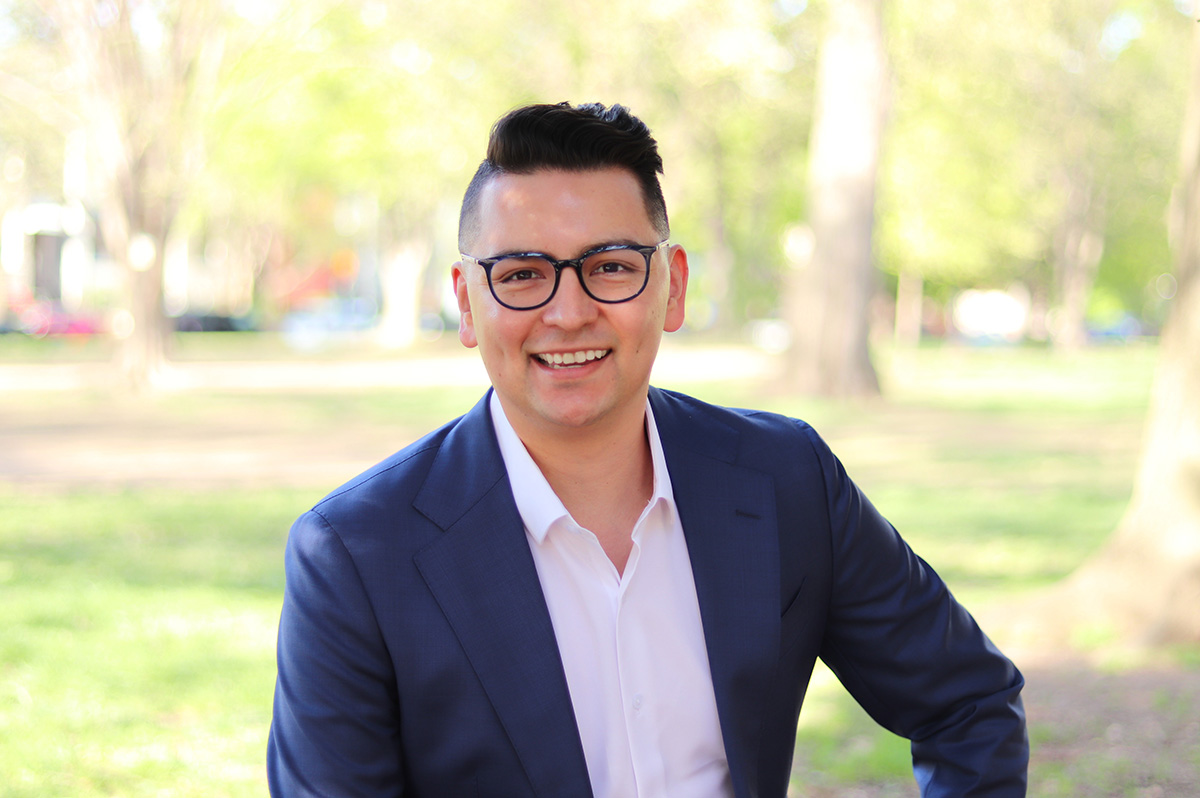
The Wanda Alston Foundation, the D.C.-based organization that has provided housing and support services for homeless LGBTQ youth since its founding in 2008, announced it has appointed longtime LGBTQ rights advocate Cesar Toledo as its new executive director.
In an April 22 statement, the organization said that as part of a planned leadership transition launched in November 2024, Toledo will succeed June Crenshaw, who Alston Foundation officials and LGBTQ community activists say has led the organization with distinction in her role as executive director for the past nine years.
In a statement released last November, the foundation announced Crenshaw was stepping down from her role as executive director after deciding to “to step into her next chapter.”
“June’s leadership has been truly transformative,” said Alston Foundation Board Chair Darrin Glymph in the group’s April 22 statement. “We are immensely grateful for her dedication and equally excited for the energy and experience that Cesar brings to lead us into this next chapter,” Glymph said.
“A seasoned LGBTQ+ advocate, Cesar brings over a decade of experience leading national campaigns, shaping public policy, and building inclusive communities,” the statement released by the group says. “Most recently, he served as the National LGBTQ+ Engagement Director for the Harris for President Campaign and has built a career focused on advancing equality and equitable education,” it says.
Biographical information about Toledo shows that immediately prior to working for the Harris For President Campaign, he served since April 2023 as deputy director for Democrats for Education Reform DC (DFER DC), a political group that helps to elect candidates for public office committed to quality education for all students, including minorities, people of color and LGBTQ youth.
Before joining DFER DC, Toledo served as political director for the LGBTQ+ Victory Fund, where he assisted in electing out LGBTQ candidates to all levels of public office across the U.S.
“I’m really excited about joining the Wanda Alston Foundation,” Toledo told the Washington Blade. “After a decade of working at the intersection of politics and policy and advancing political candidates and equitable education here in D.C., I wanted to shift my career to direct services to the most vulnerable folks in the LGBTQ+ family and our homeless youth,” he said.
Among other things, he said he would push for increasing the Alston Foundation’s visibility and mainlining its services for LGBTQ youth at a time when the national political climate has become less supportive.
A statement on its website says the Alston Foundation was founded in 2008 “in memory of Wanda Alston, a fierce LGBTQ+ activist, national advocate, and government official who was admired by District residents.”
The statement adds, “The foundation opened the first housing program in the nation’s capital in 2008 providing pre-independent transitional living and life-saving support services to LGBTQ+ youth.”
In a separate statement, the Alston Foundation announced it would hold a “thank you” celebration of appreciation for June Crenshaw from 6-8 p.m. on May 20 at Crush Dance Bar located at 2007 14th Street, N.W. in D.C.
“Let’s come together to celebrate her dedication and commitment for everything she has done for the LGBTQIA homeless youth population,” the statement says.
Federal Government
HHS to retire 988 crisis lifeline for LGBTQ youth
Trevor Project warns the move will ‘put their lives at risk’

The U.S. Department of Health and Human Services is planning to retire the national 988 crisis lifeline for LGBTQ youth on Oct. 1, according to a preliminary budget document obtained by the Washington Post.
Introduced during the Biden-Harris administration in 2022, the hotline connects callers with counselors who are trained to work with this population, who are four times likelier to attempt suicide than their cisgender or heterosexual counterparts.
“Suicide prevention is about risk, not identity,” said Jaymes Black, CEO of the Trevor Project, which provides emergency crisis support for LGBTQ youth and has contracted with HHS to take calls routed through 988.
“Ending the 988 Suicide and Crisis Lifeline’s LGBTQ+ youth specialized services will not just strip away access from millions of LGBTQ+ kids and teens — it will put their lives at risk,” they said in a statement. “These programs were implemented to address a proven, unprecedented, and ongoing mental health crisis among our nation’s young people with strong bipartisan support in Congress and signed into law by President Trump himself.”
“I want to be clear to all LGBTQ+ young people: This news, while upsetting, is not final,” Black said. “And regardless of federal funding shifts, the Trevor Project remains available 24/7 for anyone who needs us, just as we always have.”
The service for LGBTQ youth has received 1.3 million calls, texts, or chats since its debut, with an average of 2,100 contacts per day in February.
“I worry deeply that we will see more LGBTQ young people reach a crisis state and not have anyone there to help them through that,” said Janson Wu, director of advocacy and government affairs at the Trevor Project. “I worry that LGBTQ young people will reach out to 988 and not receive a compassionate and welcoming voice on the other end — and that will only deepen their crisis.”
Under Trump’s HHS secretary, Robert F. Kennedy, Jr., the agency’s departments and divisions have experienced drastic cuts, with a planned reduction in force of 20,000 full-time employees. The Substance Abuse and Mental Health Services Administration has been sunset and mental health services consolidated into the newly formed Administration for a Healthy America.
The budget document reveals, per Mother Jones, “further sweeping cuts to HHS, including a 40 percent budget cut to the National Institutes of Health; elimination of funding for Head Start, the early childhood education program for low-income families; and a 44 percent funding cut to the Centers for Disease Control, including all the agency’s chronic disease programs.”
Virginia
Gay talk show host wins GOP nom for Va. lieutenant guv
John Reid becomes first out gay nominee for statewide office in state
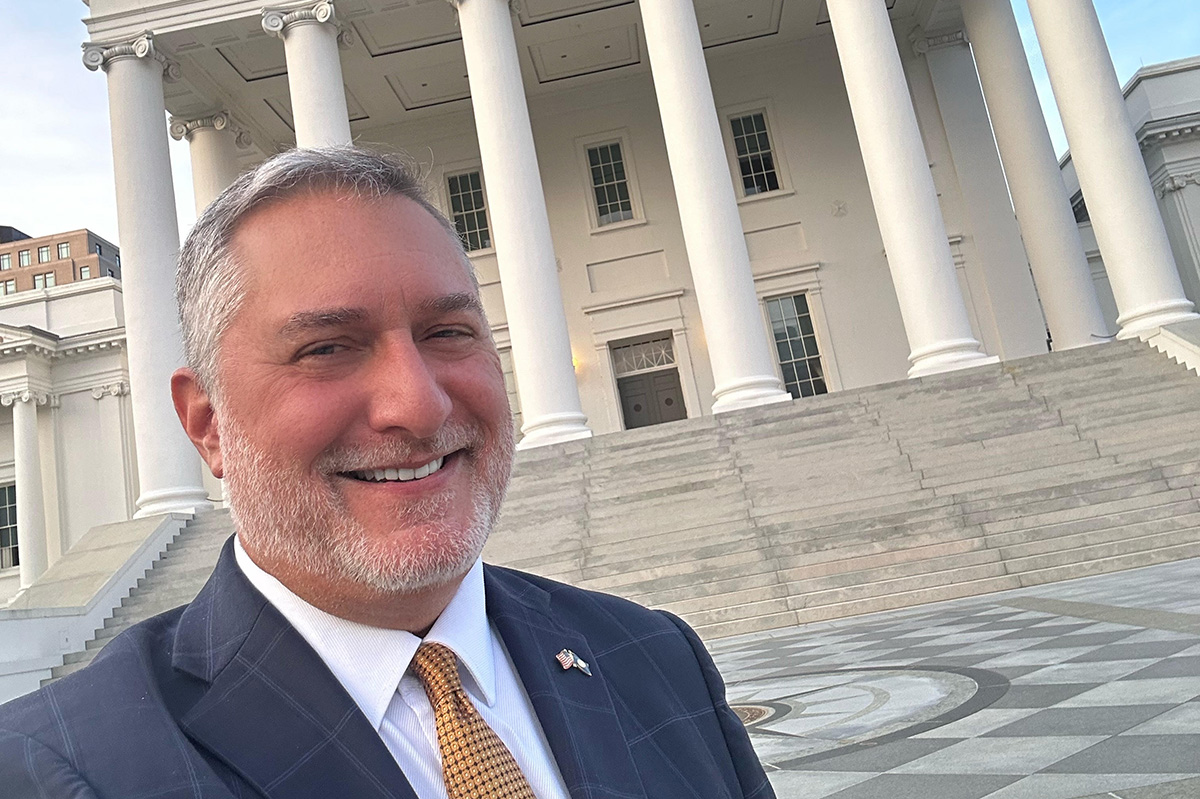
John Reid, a conservative gay radio talk show host in Richmond for many years, this week secured the Republican nomination for the office of lieutenant governor in Virginia, becoming the first known openly gay person to be nominated for a statewide office in that state.
Reid secured the nomination after his only rival in the Republican primary, Fairfax County Supervisor Pat Herrity, dropped out of the race this week for health reasons.
Herrity’s decision to withdraw from the race finalized the GOP nominees for Virginia’s three statewide contests in the November general election in what political observers are calling an unusually diverse GOP slate.
Current Virginia Lt. Gov. Winsome Earle-Sears, a Black woman, captured the GOP nomination for governor without a GOP opponent. Jason S. Miyares, a Hispanic man, is running for re-election as Virginia attorney general without a GOP rival. And Reid, a gay man, is the GOP nominee for lieutenant governor.
Reid will face one of six Democratic candidates for lieutenant governor who are competing in the June 17 Democratic primary.
The Blade spoke with Reid on Tuesday. Below is a partial transcript of that interview.
Blade: Is there a message you have for LGBTQ voters in Virginia, including Democrats, for why you think they should vote for you?
Reid: Well, the thing that I would say to gay voters who are looking and examining the candidates, is that I was out of the closet as a gay Republican publicly in very difficult rooms where people weren’t accepting of gay men – long before Donald Trump said I don’t care about this stuff.
And long before polite society said this was OK. So, in the ‘90s I came out on television and said on Oct. 11 – it was on National Coming Out Day. It was probably in 1996 or 1997. I started at the TV station in 1994. So, it was a couple of years into it.
I came out and said you never know your news anchor could be gay on National Coming Out Day. And everyone was appalled. How can you say this? You’re not supposed to say something like that. So even though I’m a Republican I know some people in the LGBT community are reflexively hostile to Republicans.
I took that step in public, and I think I helped change a lot of minds within the Republican Party and within central Virginia, which continues to be a pretty conservative place by being true to who I am. I spoke out in meetings around Republican staff and legislators and said I think we are not doing the right thing by being hostile to gay marriage.
We talk about the importance of family – Republicans talk about the importance of family, the importance of marriage as a fundamental building block of society. And a gay marriage is a net positive. Is it biblical to people who are following traditional Christian theology? No. But is it good for our society to have people in committed relationships? I think yes.
When we were going through the debate over gays in the military I said I see no reason that someone who is qualified to be in the military and can meet every single standard that everyone else is asked to meet, why should they not be in the Naval Academy, the Air Force Academy, West Point? Or serving as a grunt in active duty. Why would we exclude those people?
And those were very unpopular positions within the Republican Party.
Blade: Your campaign website says you have supported civil unions for same-sex couples. I could have missed seeing it, but I didn’t see an expression of support for gay marriage. Are you saying now that you support full same-sex marriage?
Reid: You know, you’re right. There is a distinction. And I think marriage is completely legitimate. Civil unions – if you want to go and sign paperwork at the courthouse – that’s great. If you want to be married and if a church wants to marry you if you find a church and religious leader and group that wants to bless that – that’s what I hope to do with my partner now.
Sometime in the near future I hope we will be married. And it’s very important to me as a Christian to be married in a church. So, that’s interesting. Most people would not draw that distinction. I appreciate that you’re drawing a distinction. I’m supportive of both.
Blade: Did you say you worked for a member of Congress? Can you say who that was?
Reid: George Allen, the senator from Virginia. And, of course, you and I – I know you’ve covered so many stories like this that you’ve brought together. But it was a very difficult position. When I started with Sen. Allen, he had a very libertarian attitude about this. The [Virginia State] constitutional amendment was not necessary. There was no need to go down that road.
And of course President Bush – George W. – was very assertive during the 2004 campaign. And then the issue continued to bubble up and you know we wound up with this amendment in the Virginia Constitution that banned gay marriage until the Supreme Court decision. And I was not supportive of that. And I voted for my boss, my senator, who I respected and still do respect.
Blade: Your website shows that your support for the gay community does not extend to the transgender community.
Reid: Yeah, I hate this. But I do think that our current focus on trans issues is where the gay rights movement has jumped the shark. And I think we’re losing support that we worked very diligently for decades to build with the average person. And I’m puzzled that the former leaders of the Human Rights Campaign had presidents when Elizabeth Birch and others – I don’t know what their stance is today.
I do recall that all of us who talked about gay rights issues focused on normalcy and that we would meet every standard that everyone else met. That all the vile things that were said about gays being pedophiles and grooming children – that simply was not true.
And I think we have stumbled into a very unfortunate and dangerous territory where we’re almost taunting the average person with an insistence that they accept drag queen story hour and the provocative books and provocative media that the average person would say, ‘You told us you were normal. – quote unquote normal – and now you are peddling an agenda which we don’t agree with and you’re being really aggressive about it.
And that’s really a difference. I know you’ve been covering it for a long time. I don’t know if you agree with this. I think we are peddling a very different political agenda today than the gay community was 20 years ago. And I think we should restrain ourselves and be cautious about that. And I think we’re in dangerous territory with the general population. And I’d urge caution about that.
Blade: Online reports show that there are as many as six Democratic candidates competing for the lieutenant governor’s position in the June 17 Democratic primary. Do you know any of them?
Reid: I’m familiar with most of them. Some are from the Richmond area. And I believe they are all very supportive of gay rights, which is I think a good thing. My reason for challenging them as a Republican – and I think there are other places where there is a lack of appropriate leadership and good judgment. And so, I don’t expect the gay issue would be a real issue. The trans issue may be a point of contention in the race.
But I don’t think the gay issue – and I do draw a distinction between the two — I don’t think that will be a real dividing line with those Democrat[ic] candidates.
Blade: So unlike when you were a TV news anchor, on your radio talk show were you able to offer more opinions and commentary?
Reid: That’s correct. There was a lot of opining, no script. So, I was able to tell stories about how I traveled to Miami, and I went to Washington. I went to the Kennedy Center and shared some of my life and lifestyle as appropriate with the audience.
Blade: Well, thank you for this interview.
Reid: I’m happy to talk to you. One of the reasons I called you back is that the political consultants have always told me don’t talk to anybody that might disagree with you. And I reject that. I have already lived 30 years as an out gay man. And it has been very difficult. And I would like to make it easier for the next generation to live their authentic selves. … Calling you and talking to you against the advice of all these people who say never do that, I’m hopeful that my willingness to engage and be candid will ultimately be well received, I hope.
-

 U.S. Federal Courts4 days ago
U.S. Federal Courts4 days agoFederal judge blocks Trump passport executive order
-

 Obituary5 days ago
Obituary5 days agoLocal attorney, LGBTQ rights advocate Dale Sanders dies at 75
-

 Mexico5 days ago
Mexico5 days agoGay couple claims Puerto Vallarta wedding venue discriminated against them
-

 Books4 days ago
Books4 days ago‘Pronoun Trouble’ reminds us that punctuation matters

